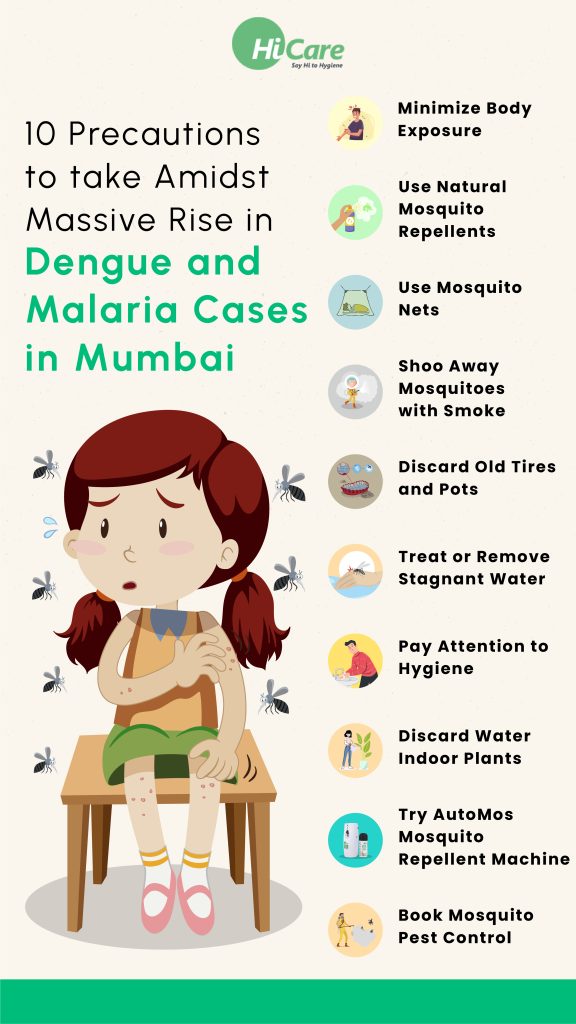Monsoon showers may cheer us up, but what else does it bring along? It also brings along the increase in cases of vector-borne diseases like malaria, dengue, and chikungunya. This is exactly happening in Mumbai at the moment, where there is a massive surge in the number of these mosquito-borne diseases.
So, is there any way out to stay protected amidst the fear of increasing cases of dengue and malaria in Mumbai or any other city that is raining? Precaution can be your only shield against these diseases caused by mosquito bites.
Be it your concern to know about dengue or malaria mosquito, or your curiosity to know how to avoid dengue mosquito naturally, we are here to help you stay safe against mosquito bites.
What is Dengue?
Dengue is a viral fever caused due to a mosquito bite. For those of you who want to know which mosquito spreads dengue, here is the answer. Aedes Aegypti is the name of the dengue mosquito that spreads this viral infection. However, not all Aedes Aegypti mosquitoes cause dengue, only if the mosquito has first bitten an infected person can transmit the infection to other human beings.
What is Malaria?
Before dengue and chikungunya, all we knew about mosquito disease was malaria. Curious to know malaria is caused by which mosquito? It is caused by the bite of a female Anopheles mosquito infected by the Plasmodium parasite. Unlike dengue and chikungunya, malaria is a parasitic infection, and not a viral infection.

Now that you know what is malaria and dengue, it is time you must update your knowledge about what precautions should be taken to prevent the risk of these mosquito-borne diseases.
10 Effective Precautions to Prevent Malaria and Dengue in Mumbai
- Minimize Body Exposure
- Use Natural Mosquito Repellents
- Use Mosquito Nets
- Shoo Away Mosquitoes with Smoke
- Discard Old Tires and Pots
- Treat or Remove Stagnant Water
- Pay Attention to Hygiene
- Discard Water Indoor Plants
- Try AutoMos Mosquito Repellent Machine
- Book Mosquito Pest Control
1. Minimize Body Exposure
The prime thing to do without spending a penny on mosquito protection is to minimize body exposure to mosquitoes. For this, wear protective clothing like long-sleeve shirts and full-length trousers. It will give fewer chances to mosquitoes to bite you.
2. Use Natural Mosquito Repellents
Opt for effective, affordable, and safe natural mosquito repellents to get rid of mosquitoes indoors. Replace your liquid vaporizer with camphor or neem lamps to stay away from chemicals. Apply lavender, citronella, or eucalyptus oil on body parts left exposed to prevent mosquito bites.
3. Use Mosquito Nets
No chemical, no messy oil, no energy bills, still so effective against mosquitoes, guess what? Mosquito nets or the machardani, the age-old hack to prevent mosquito bites. These can be easily bought as per your requirement to ensure mosquito-free sound sleep at night.
4. Shoo Away Mosquitoes with Smoke
Fogging is a successful technique to prevent mosquitoes and other pests. You can follow the same concept of smoke to repel mosquitoes that may spread dengue, malaria, and chikungunya. For this you may try burning dried lavender leaves, camphor, mosquito coils, fast cards, and mosquito repellent mats. Smoke emitted by all these is dreadful for mosquitoes, and they end up leaving your place.
5. Discard Old Tires and Pots
Another important precaution to take to stay away from the risk of malaria and dengue cases is by discarding old tires and pots. Mosquitoes find these as hotspots to breed without any fear. So, snatch these breeding grounds by decluttering your home of old tires, pots, and similar things that may hold on to the water for a long time.
6. Treat or Remove Stagnant Water
One basic precaution to take amidst the rise in dengue and malaria cases in Mumbai is to remove stagnant water. It may seem difficult to remove all the puddles in the rainy season, so one can treat the water by spraying it with insecticides or larvae-destroying oils. The aim is to curb mosquito breeding by not allowing mosquitoes to breed in stagnant water.
7. Pay Attention to Hygiene
When thinking of effective malaria and dengue mosquito precautions, focus on hygiene at home. Do not let garbage bags rot, change them regularly. Companies like HiCare recommend using mosquito and cockroach repellent garbage bags to eliminate all chances of pest infestation at home.
8. Discard Water Indoor Plants
Placing indoor plants do add to the beauty of your house but don’t let this beauty bring havoc to your health. Some water indoor plants tend to act as magnets to attract mosquitoes. So, try to discard all such water indoor plants to minimize the chances of mosquito breeding and hiding in your house.
9. Try AutoMos Mosquito Repellent Machine
What to do if you do not trust the effectiveness of natural mosquito repellents, and are afraid of the harmful chemical emissions of other mosquito repellents? AutoMos Mosquito Repellent Machine is the answer to your mosquito woes. It is India’s 1st automatic mosquito dispenser spray that emits 4 times less chemicals and costs you just Rs. 5 per day for round-the-clock mosquito protection.
10. Book Mosquito Pest Control
If none of the above-mentioned ways help you to get rid of mosquitoes, try a professional mosquito pest control in Mumbai. Consider India’s 1st 3X Mosquito Control Treatment offered by HiCare. It is a triple-action treatment that treats your walls, water, and air to repel all types of mosquitoes for up to 3 months with just one service.

Conclusion
As Mumbai grapples with a significant upswing in Dengue and Malaria cases, it is of utmost importance for residents to prioritize their health by adopting effective precautions. Seeking the expertise of reputable pest control service company such as HiCare becomes a crucial step in mitigating the risk of mosquito-borne diseases. With a focus on mosquito control services and employing specialized mosquito pest control measures, individuals can create a protective shield around their homes. HiCare, with its proven track record in pest control services, stands as a reliable partner in this collective effort to combat the surge in cases. By integrating these precautionary measures into our daily lives, we can contribute to a healthier and safer Mumbai for everyone.
FAQs
1. Is dengue spreading in Mumbai?
Dengue cases in Mumbai typically peak during the monsoon season (June-September) due to favorable breeding conditions for mosquitoes. While the monsoon has passed, sporadic cases continue to be reported.
2. Is malaria common in Mumbai?
Similar to dengue, malaria cases in Mumbai also surge during the monsoon and then decline. The city's tropical climate and monsoon seasons create conditions conducive to mosquito breeding, which can contribute to the transmission of malaria.
3. Why are mosquitoes increasing in Mumbai?
The mosquito menace in Mumbai is fueled by a convergence of factors. The city's warm and humid climate, particularly during the monsoon season, establishes optimal conditions for mosquito breeding. Stagnant water, a consequence of open drains, clogged gutters, and unmanaged waste, serves as prolific breeding grounds for mosquitoes. The rapid pace of urbanization and ongoing construction projects contribute to altered drainage patterns, creating new habitats for mosquitoes. Compounding the issue, inadequate infrastructure, including deficient sanitation and waste management systems, exacerbates the proliferation of mosquitoes, posing a significant challenge to effective vector control measures in the city.
4. How to Get Rid of Mosquitoes in Mumbai?
To mitigate mosquito infestation in and around your home, adopt several preventive measures. Start by eliminating potential breeding sites, such as stagnant water in flower pots, tires, and open containers. Utilize mosquito nets while sleeping and apply repellents to provide personal protection. Enhance home defenses by installing door and window screens, which serve as barriers to prevent mosquitoes from entering living spaces. Additionally, consider the use of indoor fogging solutions to target hidden breeding areas within the home, enhancing overall mosquito control efforts.
5. How to Prevent Mosquito-borne Diseases in Mumbai?
Preventing mosquito bites serves as a fundamental strategy in the prevention of mosquito-borne diseases such as dengue and malaria. To minimize the risk of exposure, consider wearing full-sleeved clothing to cover arms and legs, particularly during the peak mosquito activity periods of dusk and dawn. Apply mosquito repellents containing DEET or picaridin to exposed skin as an additional protective measure. Steer clear of areas prone to mosquito breeding, especially stagnant water sources, and locations with high mosquito populations. Community involvement is crucial in this effort, so report any potential mosquito breeding sites to local authorities, contributing to collective measures aimed at reducing mosquito-borne disease transmission.




